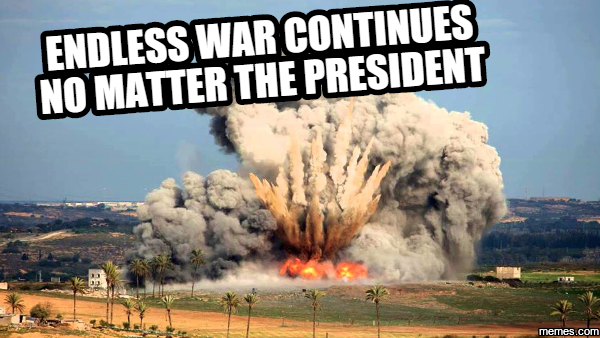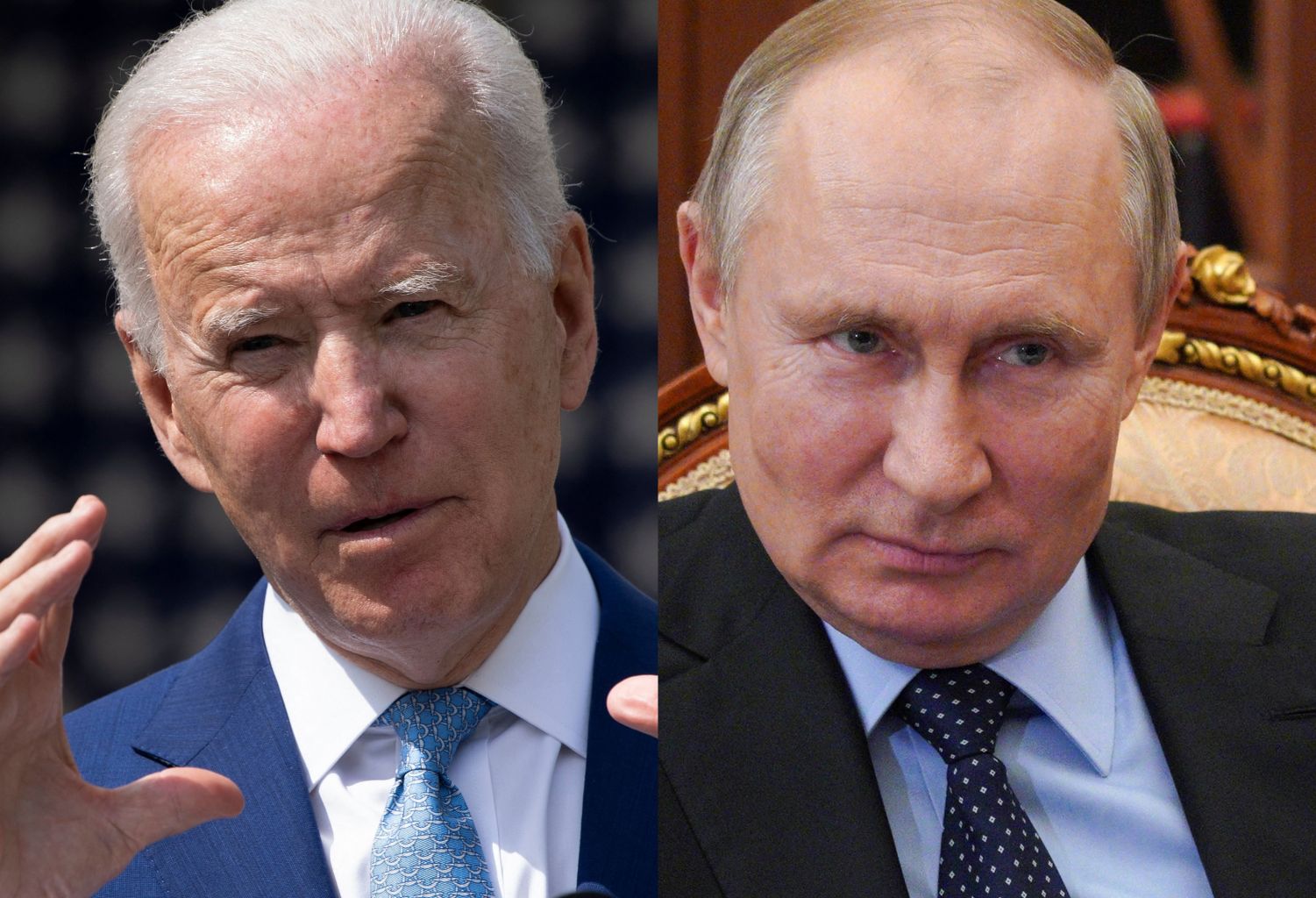
Global Powers Gotta Do Everything, Says the Blob
Doug Bandow / AntiWar.com
(January 24, 2022) — For a decade American presidents have sought to concentrate on Asia, the center of global economic growth. For a decade they have been diverted to Europe, the Middle East, and North Africa.
President Barack Obama famously announced a “pivot,” later renamed “rebalance,” to Asia. Yet he twice doubled down on troops in Afghanistan, got the US involved in three Mideast conflicts — Libya, Syria, and Yemen — and led efforts to confront Russia over its clash with Ukraine. Occasionally an administration official would venture to Asia, but Secretary of State John Kerry finished his term while spending most of his time flying to and from the Mideast.
President Donald Trump sought reelection as the scourge of China. However, he began his presidency with a trip to Saudi Arabia and filled his term genuflecting to a succession of unsavory Middle Eastern dictators, most notably Saudi Crown Prince Mohammed bin Salman, Egyptian dictator Abdel Fattah al-Sisi, and Turkish President Recep Tayyip Erdogan.
Trump allowed Israel’s Benjamin Netanyahu to set US Mideast policy, with a destructive fixation on Iran. The president ostentatiously insulted the Europeans but increased Washington’s financial and troop commitments to the continent and treated Moscow with greater hostility than had Obama.

President Joe Biden came into office also having run against China, but he immediately went native and focused on policy elsewhere. He abandoned his criticism of Saudi Arabia and supported the royals’ continuing murderous war against Yemen. Afraid to act quickly to resuscitate the Iranian nuclear deal, his officials dithered, eventually threatening a recalcitrant Tehran with war. As 2021 came to a close Washington was hopelessly entangled in the Russo-Ukrainian confrontation with talk of a European war. Beijing was barely an afterthought as 2022 dawned.
So much for the pivot, rebalance, or whatever else one wants to call it.
At least these presidents seemed to believe that they should concentrate on the geographic region most important to America. Other policymakers reject this strategy. On a webinar on the Indo-Pacific Michael J. Green of the Center for Strategic and International Studies insisted: “We can’t choose which regions we’re involved in. We are a global power.”
When called to set priorities, make choices, justify decisions, and trim responsibilities, members of the Blob grow strangely passive. They appear to believe: “What can I do? Destiny calls us to run the world. Our military is everywhere. We are what we are. America must always wander the globe lecturing, sanctioning, punishing, bombing, occupying, and invading other nations. It’s just who we are and what we do. We have no choice.”
In fact, every intervention is a decision and within US control. A succession of individual choices gave Washington global reach. Americans acquired and accumulated power, which they used all over the world. Sometimes for good, but too often for ill. Consider victims of what Yemenis call the Saudi-American War. The Trump State Department warned that US officials might be guilty of war crimes. Because of the decisions that they knowingly made. Yet they refused to end America’s participation in the war. It would be no defense for them to claim that they couldn’t choose not to do so because the US is a global power.

Similarly, amid the crisis over Ukraine and Russia, President Joe Biden acknowledged that Kyiv is not a member of NATO and thus the US has no military commitment to that government. But in every other way he treated Ukraine like an ally. It would have been ridiculous for him to say that he couldn’t distinguish between European nations, that we’re involved there and thus must help every country, irrespective of the cost. Allies, whether quasi- or real, are not equivalent to Facebook Friends, the more the better; Washington should evaluate circumstances and interests in deciding with which countries to partner.
Failing to choose among regions also prevents setting priorities. Even global powers must decide where they are active, devote resources, and go to war. During the Cold War the US and USSR competed around the globe. However, their commitments varied by region.
Moscow intervened militarily in Eastern Europe while America stayed out. The Soviets didn’t worry much about the Pacific, which the US dominated. They put some effort into Latin America but yielded to Washington’s greater efforts, as in Cuba. As resources got scarcer Moscow dropped expensive commitments, such as the Afghan war, staying only half as long as America did. The US more often yielded to the folly of sunk costs, tossing away more lives and wealth attempting to redeem past failure in both Vietnam and Afghanistan.
In coming years Washington policymakers will face greater pressure to make trade-offs, reducing involvement in some places to sustain intervention elsewhere. The Middle East is of declining value. New sources of energy have been developed and the US has become the world’s top energy producer. There no longer is a Soviet Union to threaten to block Western access to its chief oil suppliers in the Mideast.
Israel is a regional superpower with nuclear weapons and has regularized relations with several Arab nations, freeing it from dependence on America for its security. Most of Washington’s “friends” are dictatorships while Israel, a nominal democracy, imposes military and colonial rule on millions of Palestinians.
Europe matches America’s and greatly exceeds Russia’s population and economy, yet the Europeans continue to play helpless dependents on the US. There is no reason they could not construct sufficient forces to constrain Moscow. Although Russia possesses substantial military power, it suffers from serious demographic, economic, and political weaknesses. It is focused on preserving what it has, not expanding its control.

Then there is Asia. It possesses an increasing share of global GDP. China plays an outsize geopolitical role, which is likely to continue expanding, though not necessarily smoothly. Intervening in East Asia will become increasingly difficult for the US — projecting power over 7000 miles from the homeland with uncertain allies against a well-prepared adversary which has focused on anti-access/area-denial military capabilities. For instance, it is simpler (though not simple) to sink an aircraft carrier than build another one, deploy it, and protect it.
If the Pentagon had an unlimited budget, manpower, and weaponry, it might credibly declare everything on earth to be a priority. However, in the real world of scarce resources if everything is a priority, nothing is. This unpleasant reality afflicts even the Department of Defense, despite the best efforts of Washington’s bipartisan War Party to keep the Pentagon’s coffers full. The American people are more interested in dealing with problems at home than building sandcastles in foreign skies.
Before President Joe Biden had completed his big spending blow-out year of 2020 in which outlays, deficits, and debt all continued skyward, the Congressional Budget Office reported:
“In the first quarter of 2020, the coronavirus pandemic ended the longest economic expansion in U.S. history and triggered the deepest downturn in output and employment since the demobilization following World War II. Increased spending and decreased revenues associated with the pandemic and ensuing recession boosted federal debt held by the public to 100 percent of GDP in 2020, up from 79 percent at the end of 2019.
Federal debt held by the public is projected to total 102 percent of GDP by the end of this fiscal year. By historical standards, that amount of debt is very large. Over the past 50 years, debt has averaged 44 percent of GDP. It has exceeded 102 percent of GDP in only two years in US history — 1945 and 1946, when debt reached 104 percent and 106 percent of GDP, respectively, following the surge in federal spending as a result of World War II.”

US debt will hit 106 percent within a decade. By 2050 the number is likely to be more than 200 percent, a back-breaking burden greatly exceeding debt levels in nations such as Greece when they suffered financial crises. It doesn’t matter if Uncle Sam wants to be a global power. He cannot be everywhere and certainly cannot devote equal resources and take equal risks everywhere.
Green’s comment helps explain Washington’s endless failures in recent years. The Blob doesn’t believe in limits. However, the real world ruthlessly imposes them. Which means that the US will increasingly need to decide where and how it is going to be involved overseas. Not everything can be treated as important; priorities must be set. Including in foreign policy.
Doug Bandow is a Senior Fellow at the Cato Institute. A former Special Assistant to President Ronald Reagan, he is author of Foreign Follies: America’s New Global Empire.
Posted in accordance with Title 17, Section 107, US Code, for noncommercial, educational purposes.